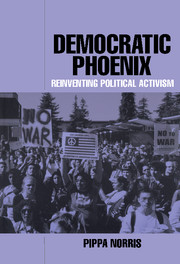Book contents
5 - Who Votes?
Published online by Cambridge University Press: 29 January 2010
Summary
Institutional explanations focus on the structure of opportunities surrounding electoral turnout. Yet even within the same country there are often substantial gaps between rich and poor, young and old, as well as between college graduates and high school dropouts. Accounts based on structure, culture, and agency have commonly been offered to explain why people participate at the ballot box. Structural accounts stress social cleavages, such as those of age, gender, and class, which are closely related to civic resources such as time, money, knowledge, and skills. Cultural explanations emphasize the attitudes and values that people bring to the electoral process, including a sense of civic norms, political interest, and party identification. Agency accounts stress the role of mobilizing organizations such as get-out-the-vote drives and social networks generated by parties, trade unions, voluntary organizations, and community associations. In short, these explanations suggest that people don't participate because they can't, because they won't, or because nobody asked.
This chapter seeks to disentangle the relative importance of these factors in determining who votes. Evidence is drawn from the 1996 Role of Government III survey conducted in twenty-two countries by the International Social Survey Programme (ISSP). Given the importance of economic development and institutional contexts that has already been established, it is important to compare turnout in a wide variety of nations. The ISSP survey covers newer electoral democracies at different stages of the consolidation process, including the Czech Republic, Hungary, and the Russian Federation, as well as long-established democracies scattered across the globe, such as the United States, Japan, and Norway.
- Type
- Chapter
- Information
- Democratic PhoenixReinventing Political Activism, pp. 83 - 100Publisher: Cambridge University PressPrint publication year: 2002



